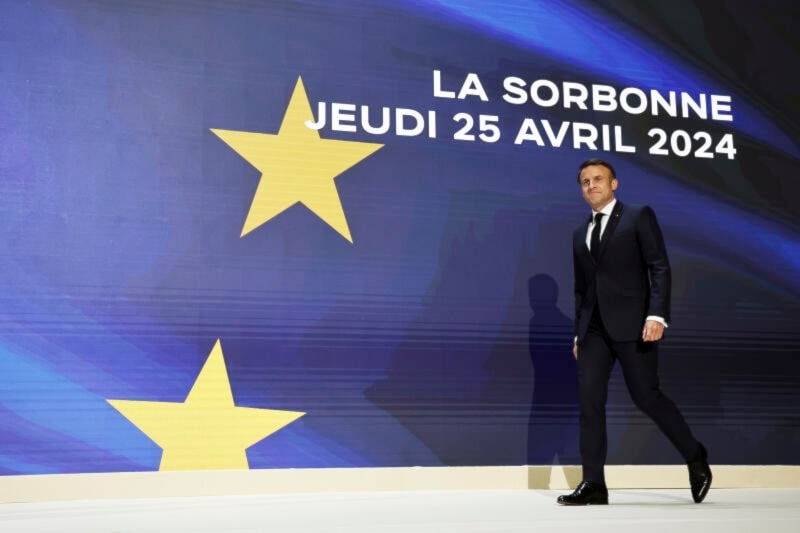Macron says Europe facing existential threat, is 'mortal', 'can die'
The French President encourages Europe to take more control of its own future, claiming that it had previously relied too heavily on Moscow for energy and Washington for security.
-

French President Emmanuel Macron arrives to deliver a speech on Europe in the amphitheater of the Sorbonne University, on April 25 in Paris. 2024. (AP)
French President Emmanuel Macron cautioned on Thursday that Europe is facing an existential threat and urged the EU to develop a "credible" security plan that was less reliant on the United States.
According to Macron, Russia's actions have been "uninhibited" as it was no longer obvious where the country''s "limits" were.
He also cautioned about what he saw as the US and China's disregard for global trade standards, urging the European Union to change its trade policies.
"It cannot work if we are the only ones in the world to respect the rules of trade - as they were written up 15 years ago - if the Chinese and the Americans no longer respect them by subsidizing critical sectors," he said.
"Our Europe, today, is mortal and it can die," he told the crowd. "It can die, and this depends only on our choices. He emphasized that the continent was not equipped to face the risks in a world where the "rules of the game have changed".
"Over the next decade... the risk is immense of (Europe) being weakened or even relegated," Macron warned, further mentioning the possibility of Iran allegedly gaining a nuclear weapon.
He claimed Europe was being "encircled" by other regional powers, while the continent was "too slow and not ambitious enough."
Macron called for a "powerful Europe" that "is respected," "ensures its security," and reclaims "its strategic autonomy."
He encouraged Europe to take more control of its future, claiming that it had previously relied too heavily on Moscow for energy and Washington for security. He stated that the "sine qua non" for European security was "that Russia does not win the war of aggression in Ukraine." He stated that he would seek bids from European allies in the coming months and that Europe also required its own cyberdefense and cybersecurity capabilities.
The French President stated that European companies should be given precedence when purchasing military equipment and supported the concept of a European loan to fund this endeavor.
Referring to the European elections on June 9, he declared that the response was not "timidity, but boldness." He railed against far-right nationalists in Europe who, he claimed, wished to stay in the "European house" but "without paying the rent" or following the "cohabitation rules".
Macron wants von der Leyen replaced: Bloomberg
French President Emmanuel Macron looks to replace European Commission President Ursula von der Leyen and is discussing options with other EU leaders, reported Bloomberg on Wednesday, citing sources.
Von der Leyen is preparing for elections in under two months, aiming to clinch another five-year tenure. Macron, a pivotal figure in her rise to the helm of the EU, has been publicly censuring the President's methods in steering the EU Commission.
“The commission presidency is there to defend the general interest, so it must not be over-politicized. Which, it has to be said, was not at all the case with this outgoing commission,” Macron said in Brussels last month.
According to Bloomberg, the French President reached out to other EU leaders regarding potential candidates to succeed the current commission leader. Among them is former Italian Prime Minister and European Central Bank President Mario Draghi, as reported by sources familiar with these deliberations.
Sources in Brussels, including individuals within von der Leyen's office, have remarked that it's still ambiguous whether Macron genuinely aimed to remove her from her position or was only exerting pressure to extract concessions from her in the future.
Von der Leyen remains a strong contender in the forthcoming elections, benefiting from her status as the primary candidate of the center-right European People’s Party (EPP), which holds the largest number of seats in the European Parliament. The EPP is poised to solidify its standing in the upcoming June elections. Nonetheless, any EPP candidate must secure support from an absolute majority in parliament.

 4 Min Read
4 Min Read









